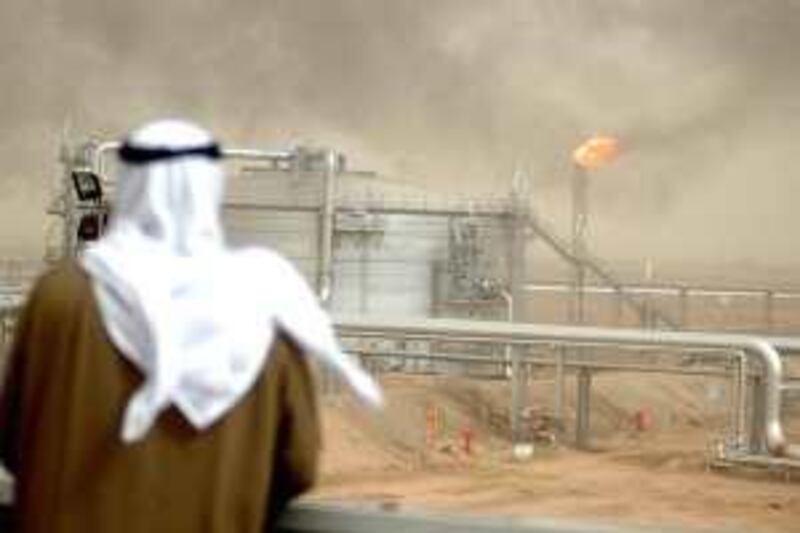Following the delay of a crucial power project and cancellation of a major petrochemicals deal in recent weeks, the next test of Kuwait's stalled energy programme will be in developing its gasfields. With Kuwaitis already suffering from summer power cuts due to electricity shortages, developing recent gas discoveries to provide fuel to the power industry should be a priority this year, analysts have said. But as the need for more gas has intensified, political deadlock in the country has shut down most investment in its energy sector. "Fears have been aired that gas development could become the next target for some parliamentarians wanting to cement their body's influence in the hydrocarbons sector, hitherto a reserve for the government and, in essence, the royal family," said Samuel Ciszuk, the Middle East energy analyst for the business intelligence firm IHS Global Insight. The state-owned Kuwait Oil Company (KOC) is planning to award by April the main engineering, procurement and construction contract for the second phase of a project to develop gas production from several deep gasfields discovered in 2006, according to industry sources. The development, tapping an estimated 32 trillion cubic feet of reserves, would more than quadruple Kuwait's gas output to 600 million cubic feet per day (cfd) by 2012 from 145 million cfd. The project's urgency is underscored by KOC's decision to proceed with drilling before awarding the construction contract, which will focus on building a gas processing plant. "The wells are being drilled and we are building the pipeline," said Mohammed Hussein, the KOC deputy general manager for gas and planning. While KOC is using Kuwaiti drilling companies and just one US rig operator, Nabors Industries, for the second phase of drilling, it will be heavily reliant on international oil companies for further development and for processing the gas. "KOC lacks the experience and expertise to develop and operate deep reservoir production by itself," Mr Ciszuk said. The snag is that Kuwait's parliament mistrusts foreign companies and has increasingly opposed their involvement in the energy sector. That was made clear at the end of last year, when Kuwait's Supreme Petroleum Council cancelled a US$17.4 billion (Dh63.91bn) petrochemicals joint venture with the US company, Dow Chemical, just a month after signing it and only days before the new company would have started operations. The cancellation followed intense criticism of the deal in parliament and calls to question Kuwait's prime minister, a member of the ruling family, over the investment. Members of parliament subsequently accused Dow of bribing officials to secure the deal. Dow vigorously denied the allegations and said it would take legal action to recoup at least $2.5bn from Kuwait. A few weeks after the Dow deal fell apart, deeply shaking investor confidence, a Kuwaiti Cabinet shuffle resulted in the appointment of the country's fourth oil minister in three years. Analysts said the main task of Kuwait's new acting oil minister, Sheikh Mohammed Al Sabah, who is also the country's foreign minister and a member of its ruling family, would be to restore confidence among investors and international oil companies. But last week, Kuwait postponed bidding on a contract worth about $2.4bn to build turbines for a crucial power project, blaming financing difficulties. "The delay is very bad news for Kuwait, as yet another project falls amid sluggish government reaction to market changes and risks," said Mr Ciszuk. Other Kuwaiti energy projects are mired in delays, including a $15bn proposal to build a refinery, and Project Kuwait, a series of oil developments valued about $51bn that are slated to start production between 2012 and 2020. The prospects for foreign investment in such projects are growing more remote as international energy companies instead pursue opportunities in neighbouring countries. In 2007, Kuwait received less than $400m in foreign direct investment, compared with $24.3bn for Saudi Arabia, the UN Conference on Trade and Development reported. But Mr Ciszuk has not quite given up on Kuwait, and thinks its urgent need for gas and electricity could prompt political change. "The necessity of the gas development is so evident that parliamentarians are likely to fear that obstructing the project would be counterproductive and portray them as obscurantist in the eyes of their constituents," he said. "But for further production growth to get under way, some serious soul-searching and a realistic assessment of the country's own weaknesses needs to be made by its power brokers." tcarlisle@thenational.ae
Testing time for Kuwait gas
The need for more gas has intensified, but a political deadlock in the country has shut down most investment in Kuwait's energy sector.

Editor's picks
More from the national




